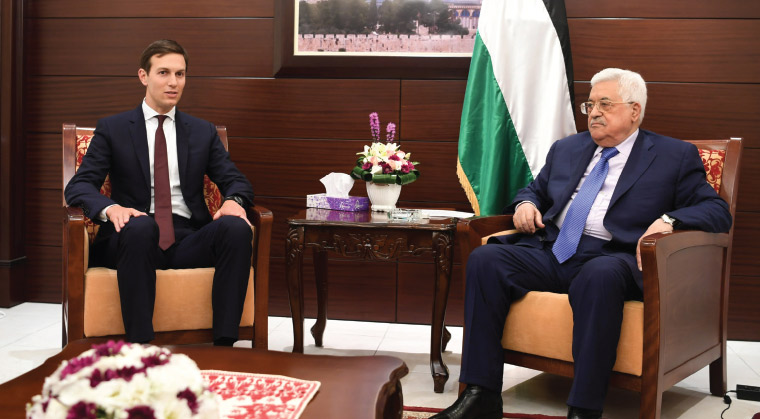Who’s Privy to the Peace Proposal?


Photos: Menachem Kalish
M
embers of the Jason Greenblatt–Jared Kushner team, as well the Prime Minister’s Office, are still mum on the soon-to-be-released peace proposal. All attempts in the last week to wheedle details out of the PMO have been for naught.
But as tight-lipped as the Israelis and Americans have been, in Jordan and the Palestinian Authority they’re as vocal as ever. Channel 11 reported that Jordanian sources told the American brokers that the developing peace plan could foment unrest in the Hashemite kingdom; and Saeb Erekat, officially the head of the Palestinian negotiating team, has already launched a series of particularly nasty anti-Israel invectives.
According to the most recent speculations, the White House plan’s first order of business will be to alleviate the humanitarian crisis in Gaza by asking the Gulf States to fund a sizable chunk of the rehabilitation. Other ideas include establishing a joint industrial zone with Egypt in Sinai, which would provide jobs and help to stabilize the economy.
Remember that the Palestinians have already boycotted the Trump administration, and the Americans as brokers. Erekat went wild when he heard reports about the White House plan, charging that the Americans are trying to divide Gaza and the West Bank, create a breach within the Palestinian people, and bring the PA to collapse. In an interview with the Al-Quds newspaper, Jared Kushner remarked with irony, “The last I checked, they are divided. They are not connected by government or land, and it’s needlessly become a dire humanitarian situation because the Palestinian leadership has made it a political situation.”
Greenblatt and Kushner left the region without meeting PA chairman Mahmoud Abbas, highly unusual considering that the plan is in its final stages. On this Kushner stated: “We have continued our work on the plan and on building consensus on what is realistically achievable today and what will endure for the future. If President Abbas is willing to come back to the table, we are ready to engage; if he is not, we will likely air the plan publicly.”
Kushner added, somewhat more bluntly, that he doubted whether Abbas was at all interested in achieving peace. But aside from all the above, there still looms the big question: Why are the Americans investing so much time, energy, and effort to advance a peace plan that the Palestinians are sure to outright reject?
A senior Israeli source told me a week ago that he believes Greenblatt and Kushner are anxious to show the world the fruit of their labors in the last year and a half, and to let the sides decide whether to adopt it or reject it. Greenblatt and Kushner may be thinking strategically: Egypt and Jordan are dependent on American aid, and Saudi Arabia and the Gulf states rely on the US to fight the Iranian influence in the region. Therefore, the interests of many Arab states dovetail with those of Israel.
We’re no longer in the 1990s, when the Palestinian issue was the cause c?l?bre of the region. For the Saudis, it’s more important to stop the Iranian threat than to spend political capital making sure the Palestinians get East Jerusalem as their capital.
Reactions among the various parties on the day the plan is unveiled will be worth watching. It’s almost certain that the Palestinians will nix the plan, but what will Saudi Arabia, the United Arab Emirates, and other states do? The latest news from the Middle East shows clearly that the Saudis are the most flexible, vis-?-vis Israel, and according to one report, even proposed Abu Dis as the Palestinian capital. (Egypt and Jordan, meanwhile, are opposed to a Palestinian capital in Abu Dis.)
It seems that the Arab states will wield considerable influence in determining the peace plan’s future and legitimacy. If they do support it, Abbas will find himself more isolated than ever before.
(Originally featured in Mishpacha, Issue 716)
Oops! We could not locate your form.













